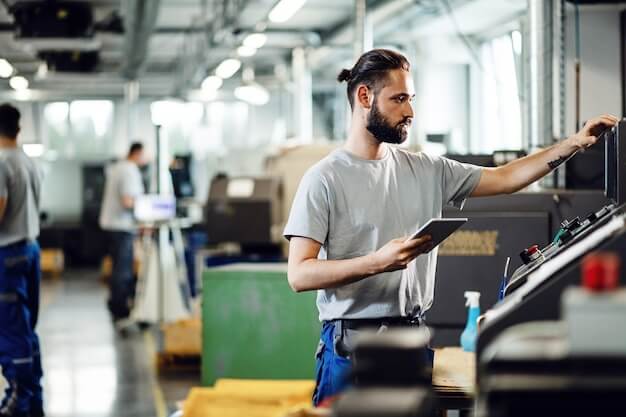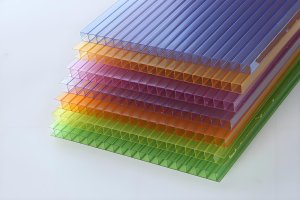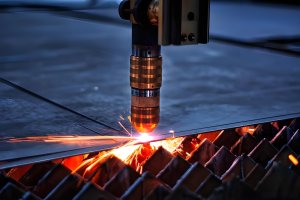Precision Aluminum Machining: An Overview
In essence, precision aluminum machining is a highly specialized production process used in various industries including aerospace. For those not familiar with the terminology, this technique involves manipulating raw aluminum into specific shapes and sizes using advanced computer-controlled machinery or CNC (Computer-Numerical Control) systems. Precision is of the utmost importance here as these parts are often vital components in larger mechanical assemblies such as aircraft engines or landing gears. The main steps of this process can be summarized in three points:
- The initial design phase where engineers use CAD (Computer-Aided Design) software to create digital models of the intended product;
- The programming phase where CAM (Computer-Aided Manufacturing) applications convert designs into machine-readable instructions;
- And finally, the manufacturing phase where automated machines perform precise cuts on the aluminum block based on the programmed commands.
Each step entails rigorous attention to detail and an acute understanding of both the material at hand—aluminum in this case—and the functional expectations of the final product. This ensures high-quality outputs that meet industry standards and regulatory requirements, especially crucial in sensitive fields like aerospace.
China Online CNC Machining Services – Want.net
Importance of Precision Aluminum Machining for Aerospace
Precision aluminum machining is fundamentally vital in aerospace manufacturing due to various compelling reasons. Foremost, aircraft parts demand strict dimensional tolerance and superior surface finish that can only be achieved via custom CNC services. They offer high precision by maintaining consistency across multitudes of components.
- Firstly, the quality and safety measures in aerospace heavily rely on this precise component production. Any deviation from designated design blueprints could lead to critical performance issues or even catastrophic failures.
- Secondly, it ensures scalability of production while keeping operational costs under control. Without these services, producing aircrafts on a large scale would be both time-consuming and financially impractical.
- Lastly, complex geometries often required in aerospace designs are achievable through the advanced software integrated within CNC systems.
In essence, precision machining arms us with the necessary tools to conquer challenges involved in creating aerospace-grade products such as engines, fuselage parts and landing gear components each with perfect accuracy, consistency and cost-effectiveness.
The process of precision aluminum machining for aerospace involves:
- Material Selection: Choosing the right aluminum grade based on the specific aerospace application requirements and desired mechanical properties.
- Tolerances and Precision: Ensuring tight tolerances and high precision in the machining process to meet the stringent requirements of aerospace components.
- Complex Geometries: Utilizing advanced CNC machining techniques to produce complex geometries and intricate features required in aerospace parts.
For precision aluminum machining for aerospace, consider utilizing a Precision Machining Service to ensure the highest level of precision and quality for your aerospace components.
Key Features and Specifics of Custom CNC Services for Aerospace
The precision that custom Computer Numerical Control (CNC) services offer is crucial in the aerospace industry where every dimension matters. One of the vital aspects of these services includes the integration of CAD software that makes it possible to design intricate parts with fewer errors and higher efficiency. This software allows operators to visualize final products before execution, ensuring exactness even in complex shapes.
Moreover, lathe work – another key feature- enables rotation of pieces against a stationary cutting tool, beneficial especially in creating symmetrical objects. Also utilizing Multi-Axis Machining, which ranges from three to five axes, results in more versatility and accuracy. This not only facilitates simpler handling complex geometries but also reduces production time significantly as tools can pivot on multiple axes. Finally, there’s automated checking, wherein sensors monitor cuts frequently to ensure part quality and instantly detect any deviations from the intended measurements.
- CAD Software Integration: Allows visualization of end products for better accuracy.
- Lathe Work: Enables creation of symmetric components through rotating pieces against a fixed cutting tool.
- Multi-Axis Machining: Provides more versatility by enabling pivoting tools on multiple axes.
- Automated Checking: Ensures component quality by constantly monitoring cuts for any deviations.<\li>
<\ul>Advantages of Using Precision Aluminum Machining in Aerospace Manufacturing
Precision aluminum machining offers distinct advantages to the aerospace manufacturing sector, with its superior durability and craftsmanship precision being paramount. This type of machining tolerates environmental stresses and extreme conditions better than most alternatives. Consequently, components manufactured through this process exhibit extended operational lifespan over those produced using conventional methods.
- The lightweight property of aluminum significantly reduces the overall weight of the aircraft, enhancing fuel efficiency.
- Its superior heat resistance ensures that parts retain shape and functionality even under high-temperature scenarios
- In addition, precision machining facilitates the achievement of complex geometries and tight tolerances required in aerospace manufacturing where a small error margin can have catastrophic impacts.
Therefore, integrating precision aluminum machining contributes substantially not only to improved performance but also to safety standards within the aerospace industry.
Case Study: A Success Story of Custom CNC Services in Aerospace
In a recent aerospace project, precision aluminum machining played an instrumental role in enhancing the efficiency and efficacy of the overall assignment. A premier client in the aerospace industry enlisted the help of one such custom CNC service provider to design components for their new aircraft model. Using state-of-the-art computer numeric control (CNC) technology, they were able to accurately sculpt aluminum parts utilized extensively within the aircraft.
- Precision was critical given the standards held in the aerospace industry; it isn’t hyperbolic to say the success or failure of the project hinged on this factor. Thanks to CNC machining’s meticulous nature, however, each component was carved with pinpoint accuracy, down to every micro-inch.
- Sustainability also improved as waste materials were significantly reduced. It resulted from the ability of these machines to make precise cuts that conventional methods could not achieve.
- The strength-to-weight ratio distinctive to aluminum renders it perfect for creating resilient yet lightweight components that are necessary for airborne vehicles. Thus, furthering aircraft performance by impacting fuel efficiency and load capabilities positively.
- Last but never least – time efficiency markedly amplified due to swift set up times and 24/7 running capacities offered by CNC machines.
This account directly illustrates how precision aluminum machining via custom CNC services can revolutionize production methodology while reinforcing quality markers we have come to associate with the aerospace sector.
Challenges Faced in Precision Aluminum Machining for Aerospace
The sector of precision aluminum machining for aerospace confronts several complex hindrances. The primary challenge lies in maintaining an impeccable standard of precision, stemming from the high-stress environments these components function within. These parts need to withstand varied weather and temperature conditions, experiencing frequent cycles of heating and cooling which can lead to material deformation.
- Material selection: Ensuring optimal material selection is crucial as each metal comes with its unique characteristics affecting machinability, durability, weight, cost, and aesthetics.
- Tight tolerances: Achieving tight tolerances proves challenging due to innate attributes of aluminum like thermal expansion or distortion during treatment processes.
- Machining speed: Balancing fast machining speeds, ensuring quality while also preventing damage from excessive heat generated is a persistent issue.
- Mass production: Maintaining consistency in mass production while not compromising on the required specifications is yet another difficult task.
In order to efficiently combat these challenges, it’s vital for CNC machinists to have comprehensive knowledge of the intricacies associated with aluminum alloys, advanced machining technologies, and strict quality control measures.
Conclusion
The critical role of precision aluminum machining in aerospace engineering cannot be understated. This approach provides numerous advantages including improved durability, weight reduction and enhanced efficiency, making it an essential element within the industry. However, managing its challenges such as material deformity under high temperatures requires expert skills and meticulous attention to detail during machining processes.
- Durability: Precision machined aluminum parts demonstrate superior strength-to-weight ratios that facilitate the production of robust aero-structures capable of withstanding immense pressures during flight operations.
- Weight Reduction: The lightweight characteristic of aluminum contributes significantly towards reducing overall aircraft weight, leading to improved fuel economy and performances.
- Efficiency: Custom CNC services enable precise design execution from complex aerospace components to simple fixtures hence streamlining manufacturing processes and promoting productivity.
- Challenges: Despite these benefits, achieving precision aluminum machining can be demanding due to issues like machine-induced deformations especially at elevated temperatures. Overcoming these entails applying suitable coolants or advanced CNC technologies that allow controlled cooling during machining.
Other Articles You Might Enjoy
- CNC Machining for Aerospace: Aluminum 2024 vs. 6063
CNC Machining and Aerospace Manufacturing In the world of aerospace manufacturing, CNC (Computer Numerical Control) machining carries significant importance. As a modern machining method that leverages computer programming to dictate…
- Precision CNC Machining of Stainless Steel: Innovations and Best Practices in Aerospace Machining
Introduction: Precision CNC Machining and the Use of Stainless Steel Precision Computer Numerical Control (CNC) machining, a vital technology within the manufacturing industry, uses pre-programmed software to guide machinery towards…
- Aerospace CNC Machining: Precision Engineering for the Skies
CNC (Computer Numerical Control) machining stands as a cornerstone in the production of aerospace components, where its application spells the difference between success and catastrophic failure. In an industry that…
- CNC Machining for Aerospace Applications: Titanium vs. Aluminum Alloys
CNC Machining in Aerospace: An Introduction and Overview Computer Numerical Control (CNC) machining is a manufacturing process that utilizes software-directed machines to fabricate complex parts with high accuracy and repeatability.…
- Precision CNC Machining: Brass vs. Aluminum - Which Material Suits Your Project?
Precision CNC Machining: Overview and Material Selection CNC machining, an acronym for Computer Numerical Control machining, is a process in the manufacturing sector that involves the use of computers to…
- Precision Aluminum CNC Machining: Cost-Effective Solutions for High-Volume Production?
Precision Aluminum CNC Machining: An Overview In the realm of manufacturing, precision aluminum CNC machining stands out as a key technique sought after for high-volume production runs. The term 'CNC'…






